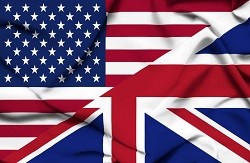Site Menu






Main Differences Between British & American English |

You may believe you have mastered the English language only to discover that different rules and words exist between American English and British English. We're going to discuss some of the main differences you will normally encounter.
One of the first differences you will notice between British and American English are the word choices used by people of both areas. Some words only exist in one form of English, whereas others may exist in both, but contain completely different meanings.
The following table shows some of the common differences in English vocabulary:
| American English | British English |
| Trunk | Boot |
| Elevator | Lift |
| Hood | Bonnet |
| Truck | Lorry |
| Freeway | Motorway |
| Gas/Gasoline | Petrol |
| Apartment | Flat |
The word "jelly" in American English means "jam" in British English, and the word "Jello" in British English means "jelly" in American English.
If you order "chips" in England, you will be served what are known as French fries in the United States or Canada. You need to ask for "crisps" in Great Britain if you actually want potato chips. Are you confused yet?
You have to be very careful with the words you choose because a term such as "pants" in American English actually refers to "panties" in British English and the word "rubber" is used to mean an eraser in American English, rather than a condom.
Many words are also spelled differently in American and British English.
Grammar rules are often different in American and British English. For example, writers of American English include periods after every initial such as F.B.I. However, writers of British English exclude the full stops for initialisms such as BBC.
British writers also normally include punctuation marks outside of the quotation marks. For example, "She ran all the way home". American English writers place the quotation marks inside the quotation marks: "She ran even faster when she heard her mother call!"